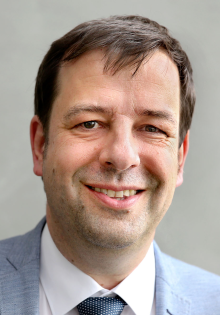The international IT symposium “Highly Efficient Accelerators and Reconfigurable Technologies” (HEART) will be held online this year, from June 21 to 23. The forum will explore the latest research findings on computer systems and methods in the context of hardware-accelerated high-performance computing (HPC). This time Paderborn is hosting the conference following Toronto and Nagasaki in previous years. The focus is on how to achieve the best computing performance and energy efficiency by using accelerators. Those who are interested have the opportunity to register at https://events.uni-paderborn.de/event/119/registrations/81/ before the end of the symposium. Registered participants will also be able to access videos of most of presentations after the event. Presentations will be held in English.
Dr. Kosuke Tatsumura, chief research scientist at the Corporate Research and Development Center of the Toshiba Corporation, will give a keynote speech on “Large-scale combinatorial optimization in real-time systems by FPGA-based accelerators for simulated bifurcation.” The subject is the optimization of real-time systems using FPGA-based accelerators. Professor Christian Plessl from Paderborn University, who is organizing the symposium, adds: “These freely programmable hardware building blocks are becoming more and more important. FPGAs – ‘Field Programmable Gate Arrays’ – are especially energy-efficient accelerators.” The second keynote speech will be by Professor Torsten Hoefler from ETH Zurich. The researcher will talk about “Portable high-performance Python on CPUs, GPUs, and FPGAs.” There will be a total of eight scientific presentations, a graduate forum, and a virtual poster session.
There will also be three special sessions on up-to-the-minute topics. Dr. Kentaro Sano and Dr. Tomohiro Ueno, both from RIKEN, Japan’s largest research institution, are organizing a session on the challenges for infrastructure and system operations of FPGAs for HPC. The second session will address challenges for high performance computing that result from the growing user-hardware gap. This session is being organized by Professor Holger Fr?ning from Heidelberg University and Dr. Felix Zahn from CERN, the European Organization for Nuclear Research. Mobile systems, edge computing and the Internet of Things are the focus of the third session, which will be led by Professor Smail Niar and Professor Ihsen Alouani, both from Universityé Polytechnique Hauts-de-France. Professor Marco Platzner, the program coordinator for the conference, explains, “These three special sessions will allow us to show that hardware-accelerated computing is a truly interdisciplinary topic, used everywhere from supercomputers to small computers in the Internet of Things (IoT).”
The symposium is being organized by the Paderborn Center for Parallel Computing (PC?) at Paderborn University. Under its umbrella, scientists research the efficient use of supercomputers and operate high performance computer systems to serve university researchers throughout the entire Ostwestfalen-Lippe region. The high-performance computing center at Paderborn University is also part of the Association of National High-Performance Computing Centers (Verbund der Nationalen Hochleistungsrechenzentren, NHR). The event organization is supported by the Collaborative Research Center “On-the-Fly Computing,” which is led by Paderborn University and funded by the German Research Foundation (Deutsche Forschungsgemeinschaft, DFG).
More information and the full program can be found at https://heart2021.uni-paderborn.de/.
Nina Reckendorf, Press, Communications and Marketing Office




